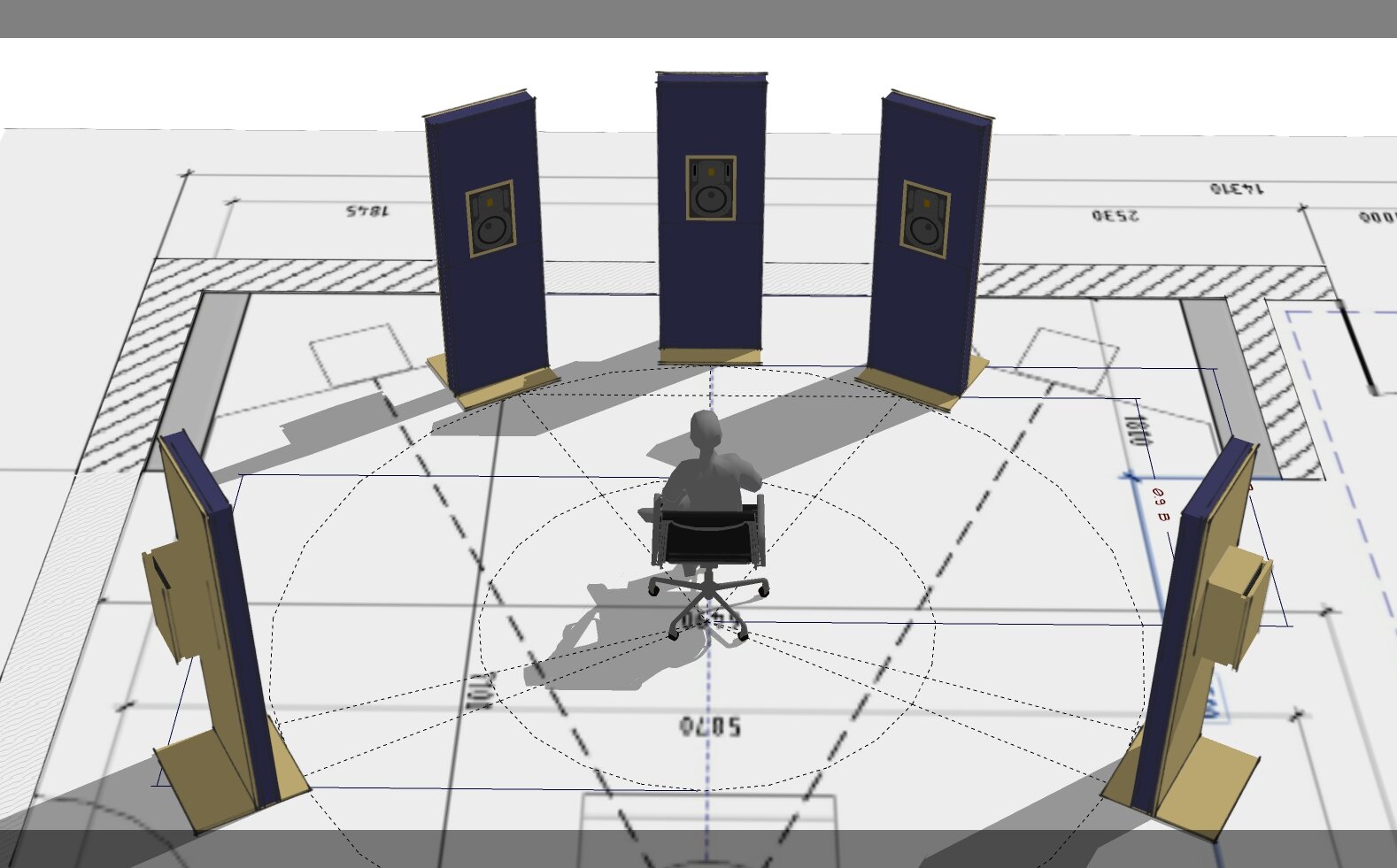-
Posts
2,297 -
Joined
-
Last visited
Everything posted by Glenn Stanton
-
sounds consistent with my experience as well. however, in W11, i'm using almost VST3 exclusively and maybe it's the CPU etc but even with stuff that didn't run reliably on W10 on an older machine, the usage meters barely move with either VST2 or 3... that said some products (i've found the Cherry Audio VST3 to consume more resources, not an issue on the new machine, and the Waves Abbey Road Chambers, unusable on W10 & older laptop, now, virtually no resources appear to be consumed on W11 and new machine). so most times, my latency is done to 64-128 samples for recording, sometimes 256, and some old 32-bit ones need 512. mix is still always 2048...
-
doesn't matter. with AI, all you song belong us now.
-
actually - there are no gates or even much compression - a bit on the 2-track. it's because of the arrangement kinds of forming a "wave" rolling action - partly because i had too much bass (i was mixing on my cube) and it made the effect very pronounced. but otherwise no compression or effects on individual instruments (only 5). some EQ on a couple of them, some delay and reverb (ambience).
-
updated with completed vocals and a better mix (hopefully ? ) 98BPM G Major ----------------------------------------------------------------- lyrics ----------------------------------------------------------------- wanna see the sunrise over your shoulder feel the breeze through your hair taste you all over then you ask me where there baby wanna travel the world all over from here to the chalk cliffs of Dover from funky Memphis to sunny LA you hold the globe and show me the way there baby we want to plant seeds in fields of gold we want to harvest what we have sown there's just one thing i want you to know take me oh take me yeah take me so take me there [solo] wanna see the sunrise over your shoulder feel the breeze through your hair taste you all over then you ask me where there baby take me there
-
i have custom workspaces which enable me to rapidly shift across overall settings (e.g. don't need a bunch of control bar stuff if mixing, vs recording) and depending on what i'm doing, then using the keystrokes (e.g. B, I) if i need to quickly view or hide something. the custom ones also prevent updates from overriding the changes i might have made in the "stock" workspaces...
-
a template has the extension ".cwt" - and if you want to embed an image in the notes section, simply rename the file to "mytemplate.cwt" otherwise, saving as a "template" type loses that for some reason. also, i put my templates into the "core/project templates" and "common/project templates" folders just to be sure.
-
yeah, next mix i'm redoing them a bit because they are a bit harsh in places. but some piercing is necessary ?
-

Cakewalk Not Re-Opening After Closing Project: Could This be the Reason?
Glenn Stanton replied to Stephen Power's question in Q&A
maybe align the CW and PC audio drivers, bit rate, etc. use the UMC22 for all (as a start). -
meaning "separate instruments / vocals from a two-track source"? or "export a project as stems"? if the latter, grouping instruments into using busses and then exporting those busses is a quick and easy way to export stems. or using aux tracks to do the same. my own mix template has exports preset for two-track WAV and MP3, and stem buss exports built-in so a quick recall settings, tweak selections, update task and run. 30 seconds to get stems of a mix exported.
-
'crunch' 'crunch' <popcorn eating sounds> 'crunch' eagerly awaiting the penile shot to see which one is bigger 'crunch' 'crunch' <more popcorn eating sounds> ?
-
final 4th round mix. updated some instruments (drums and solo), lyrics and vocals. ----------------------------------------- Lyrics ----------------------------------------- was i reticent was i hesitant not at all was i innocent were there elephants not so sure was i melancholy wasn't satisfied not at all when the music played we would dance to a separate song wasn't reticent didn't hesitate maybe innocent 'cause those elephants hide in sight never was right thus cause grief when all is belief to be real now you cryin' 'cause you lyin' now you know the feel is real was i reticent was i hesitant not at all was i innocent were there elephants not so sure was i melancholy wasn't satisfied not at all then the music stopped we would cry go our separate ways was i innocent were there elephants not so sure then the music stopped we would cry go our separate ways
-
you can find your product code (if you used one) - either through the system settings or check - there are some simple scripts to dump it in a command window. or link it to your MS account (i have a live.com account which carries the license so if i reinstall the OS is just activate it online). i think the W10 "only nag" passed long ago and it now will disable certain features unless activated.
-
my laptop came with W11 home and it seems to run all my software ok. when installing an upgraded OS like home to pro or W10 to W11 - i recommended clean install followed by re-install all software etc, PITA but much more reliable that way.
-

Recording with NUX Mighty Space
Glenn Stanton replied to southcoaststeve's topic in Instruments & Effects
look under the audio devices. if the device has its own ASIO, then you will need to use that exclusively for the IO as ASIO is a single type only. whereas if you can use the WASAPI Shared mode, then you'll have more options for input vs output. -
this ^^^ always record the MIDI along with the audio (on any MIDI source really), then as John suggests you can replace the piano (with another piano, organ, or guitar, etc) if you're not happy with the keyboard audio, or simply want to do another parts in the arrangement with something else. Hammersmith free is decent, EZ Keys2 has a nice grand, most times i'm using Hammersmith Pro. or oddly enough, a very old Steinway D soundfont (sf2), or an old 1890 Bösendorfer piano soundfont, and they both sit in a mix nicely... played via the free sforzando VST.
-
yeah but what happens when someone else is the singer? and the tracks are done and dusted and now need to be mixed? so vocal training is nice, vocal caching is also nice, and having only / nearly perfect vocals arrive from parts unknown is also nice. ? but -- if i may -- i tend to do call the comping and then apply the pitch fixes as it's faster for me to get the emotional content and timing first, then adjust pitch if needed. i guess it depends on the workload and time pressures that its not always feasible to go back to fix a take's pitch but rather get it all in one shot as much as possible.
-
the Melodyne "separations" are the small blob audio clips it uses to store the audio + the edit metadata.
-
all this just in time for engineers and artists to be replaced by AI ? you know, those AI / Machine Learning plugins we have nothing to worry about ?
-
the Voice products are very nice - one thing i've noted from different people using them - if you do not have good pitch, turn off the harmonizer ? but i've some friends using these who do have great pitch and man oh man, the harmonies are amazing. and as John noted - blend in the pitch corrections. one addition i forgot to mention wrt levels - the Expose 2 app is very nice (not sure if it's still free or not) but you can drag a bunch of tracks onto it and get a rough estimate on the levels, eq and LR balance etc and compared to "standard" for streaming, CD, etc. and get text content about the track as well as export the full set of results into a text file. EXPOSE 2 | Audio Quality Control Application (masteringthemix.com) https://www.masteringthemix.com/products/expose-2
-

Recording audio to external drive
Glenn Stanton replied to Dave Gelzleichter's topic in Computer Systems
not necessarily an "external" drive but typically a separate one to avoid OS and other activities on the drive causing issues with the audio streaming on/off the disk. seems to be less of an issue with SSD (imho). my content disk, OS disk, and recording project disks are three separate SSD drives with only the OS being internal and the other two attached to my USB3 ports. -
no, the other 20 just like it... where RTFM means "real time fun machine" and "i don't need to read directions" or "don't tell me what to do"....
-

Cakewalk crashes when trying to open Project
Glenn Stanton replied to tdehan's topic in Cakewalk by BandLab
what happens when you create a new blank project? -

Cakewalk crashes when trying to open Project
Glenn Stanton replied to tdehan's topic in Cakewalk by BandLab
reinstall CW and/or the redistributable package.



